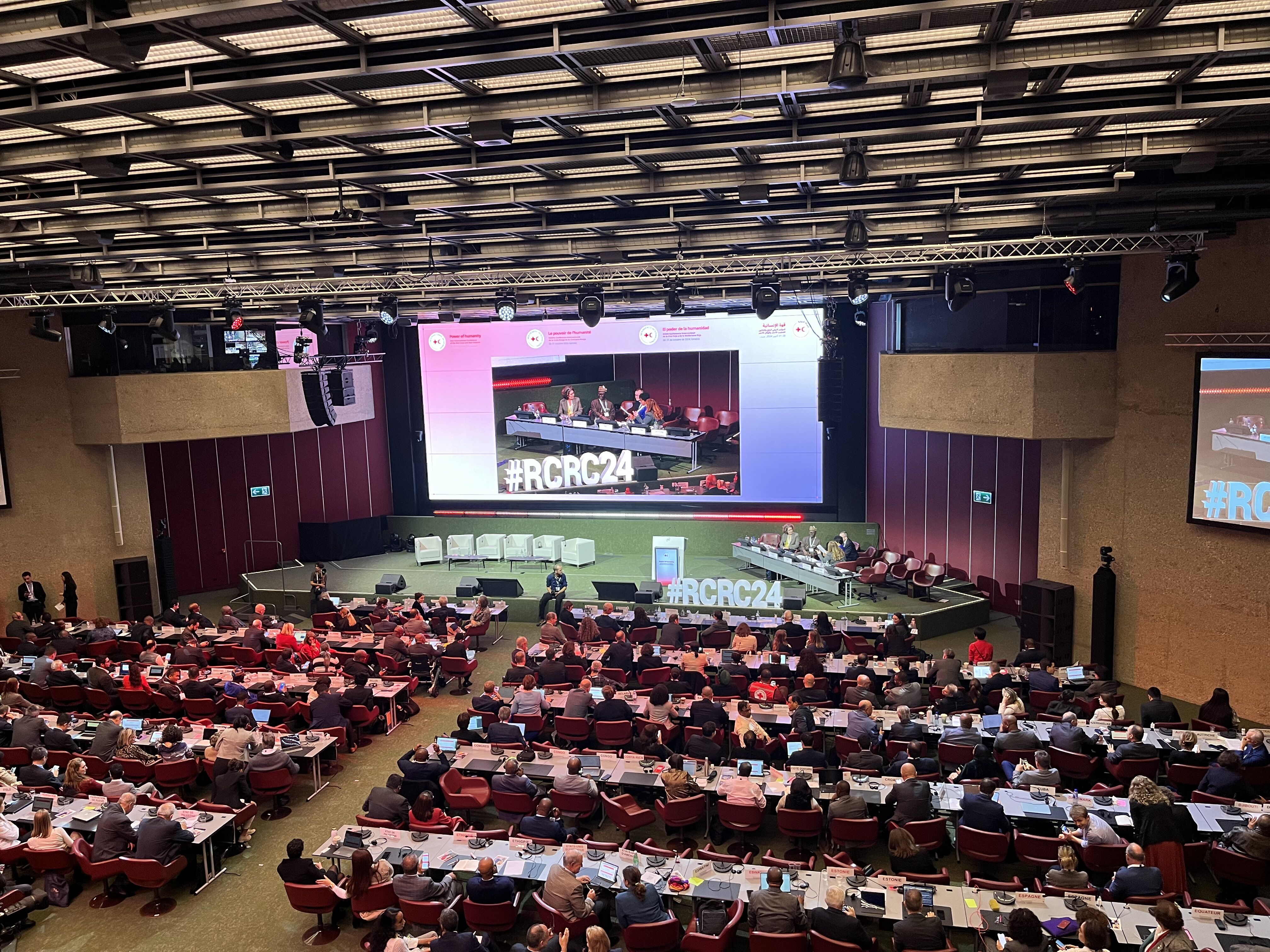The 34th International Conference of the Red Cross and Red Crescent took place in Geneva, gathering key humanitarian actors and government representatives. The event was divided into three main meetings: the General Assembly, the Council of Delegates, and the International Conference.
The General Assembly, held from October 22–25, included the International Federation of Red Cross and Red Crescent Societies (IFRC) and 191 National Societies. This gathering set strategic priorities for the Federation, focusing on key themes such as trust, integrity, localisation, volunteering, and strengthening National Societies to enhance global humanitarian impact.

From October 27–28, the Council of Delegates brought together the IFRC, International Committee of Red Cross (ICRC), and National Societies to discuss shared strategies and align approaches to global humanitarian issues, reinforcing cooperation and acquiring a unified response to current challenges. During the 2024 Council of Delegates, the following resolutions were adopted:
- Protection in the Movement: improving collective impact in protecting people (CD/24/R1).
- Migration Strategy for the International Red Cross and Red Crescent Movement 2024–2030 (CD/24/R2).
- Weapons and International Humanitarian Law (CD/24/R3).
- Implementation of the Memorandum of Understanding and Agreement on Operational Arrangements dated November 28, 2005, between Magen David Adom in Israel and the Palestine Red Crescent Society (CD/24/R4), along with the report.
- Call for Respect and Support for Principled Humanitarian Action (CD/24/R5).
- Extension until 2030 of the Restoring Family Links Strategy for the International Red Cross and Red Crescent Movement 2020–2025 (CD/24/R6).
- Reaffirming the Role of the Movement as a Factor of Peace (CD/24/R7).
- War in Cities: A solemn appeal from the International Red Cross and Red Crescent Movement (CD/24/R8).
- Work of the Standing Commission of the Red Cross and Red Crescent (CD/24/R9).
In International Conference years, the Council of Delegates precedes the International Conference and adopts the conference’s agenda. From October 28–31, the International Conference gathered National Societies and 196 state parties to the Geneva Conventions. The Conference adopted six resolutions:
- Resolution 1: Building a universal culture of compliance with international humanitarian law.
- Resolution 2: Protecting civilians and other protected persons and objects against the potential human cost of information and communications technologies (ICT) activities during armed conflict.
- Resolution 3: Strengthening disaster risk governance through comprehensive legal and regulatory frameworks.
- Resolution 4: Enabling local leadership, capacity, and delivery in principled humanitarian action and strengthening resilience.
- Resolution 5: Protecting people from the humanitarian impacts of extreme climate and weather events through strengthened anticipatory action.
- Resolution 6: Implementation of the Memorandum of Understanding and Agreement on Operational Arrangements dated November 28, 2005, between Magen David Adom in Israel and the Palestine Red Crescent Society.
Furthermore, the International Conference elected a new Standing Commission. The Standing Commission of the Red Cross and Red Crescent Movement acts as the trustee of the International Conference, therefore making it the Movement's highest decision-making body which meets every four years. Between conferences, the Commission provided strategic guidance to unify the Movement’s approach to humanitarian action. The newly elected members are Ms. Mercedes Babé (Spanish Red Cross), Mr. Georges Kettaneh (Lebanese Red Cross), Mr. Wang Ping (Red Cross Society of China), Dr. Helen Durham AO (Australian Red Cross), and Mr. Sven Mollekleiv (Norwegian Red Cross).

As an apolitical and purely humanitarian forum, this year’s meeting took place at a critical time amid escalating conflicts and disasters, underscoring the urgency of refocusing global attention on the populations facing today’s crises. IFRC President, Kate Forbes, highlighted the Movement’s role in uniting people during crises, while ICRC President, Mirjana Spoljaric, emphasized the urgent need to protect civilians in conflict zones and reinforce commitments to international humanitarian law (IHL).
The conference reaffirmed the Red Cross and Red Crescent Movement's legacy of neutral, impartial humanitarian action. As humanitarian needs evolve, the Movement remains committed to addressing global crises and advancing solutions to protect human dignity and rights.
Geneva International Centre for Justice (GICJ) emphasises the fundamental principles of International Humanitarian Law (IHL). The IFRC and ICC meetings are important as they ensure that the regulations and application of IHL are adapted to current global realities, informed by the perspectives of both the people on the ground (National Societies) and the states. GICJ calls on states to uphold their obligations which include but are not limited to ensuring that humanitarian aid is delivered without obstruction and in accordance with international law, protect human dignity, alleviate suffering, and safeguard civilians. Overall, upholding the IHL principles of distinction, proportionality, military necessity, humanity, the prohibition of attacks against those hors de combat, and the prohibition of the infliction of unnecessary suffering.







